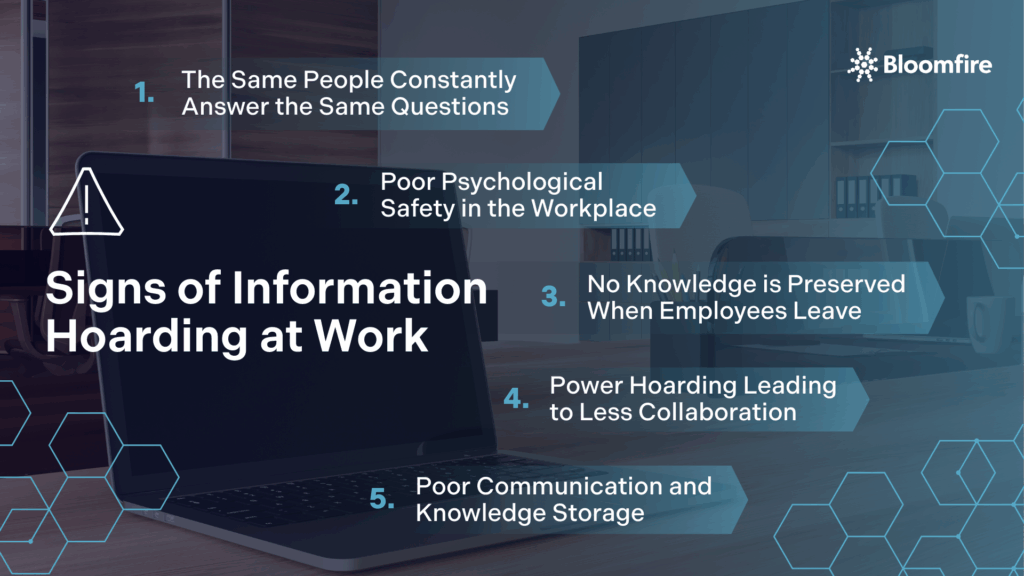5 Signs of Information Hoarding at Work

Does this sound familiar? Employees spend a lot of time searching for answers they need, only to discover that someone in a different department is the only one with that specific knowledge. And when you ask them to share that information, they are hesitant to be forthcoming with it.
This is an example of knowledge hoarding, and it can be a significant yet often overlooked issue for your company. When critical information is kept locked away, employees waste hours chasing answers instead of focusing on their work, and overall expertise within the organization begins to decline. Subtle warning signs, like limited collaboration or poor knowledge sharing, can easily go unnoticed. Recognizing some early clues of information hoarding at work is the first step toward preventing a problem that, if left unchecked, can erode productivity, trust, and innovation.
Why Do Employees Hoard Information?
Employees hoard information at work for a variety of different reasons, so it’s important to understand why people would hoard knowledge in the first place.
- Employees become territorial: After several years of hard work, employees often become territorial of their knowledge. They might fear that sharing knowledge they worked so hard to gain will undermine their expertise, or even give credit to others where credit is not due.
- Job security: Some employees hoard knowledge at work because they feel a sense of job security when others consistently come to them for advice. These individuals see that they won’t lose their jobs due to their specialized knowledge. If that knowledge is shared, they might fear that other people will take their position.
- No collaboration: In some cases, information sharing and collaboration are simply not encouraged. This alone can cause many issues within your company and inevitably lead to information silos.
Whatever the reason may be, the results remain the same: productivity suffers, company finances decline, and employee onboarding becomes a hassle. Luckily, there are some indicators to suggest that information hoarding is at work.
Signs of Information Hoarding at Work
Knowledge hoarding can manifest in different ways and be caused by various factors. However, regardless of the circumstances, information hoarding at work will have a negative impact on your company. To combat knowledge hoarding, it’s best to attack the potential signs directly to ensure information hoarding isn’t a problem in your company. Here are five signs that information hoarding might be present in your company, and how a knowledge management platform can help you combat knowledge hoarding.

1. The Same People Constantly Answer the Same Questions.
Your company has subject matter experts to handle specific questions, and there’s nothing wrong with that. But if you find a handful of employees consistently answering the same questions over and over again, you might have a problem. This highly requested knowledge isn’t being proactively shared but rather hoarded by employees who refuse to share it broadly.
When frequently asked questions arise, it is essential to document the answers in a readily accessible format, stored in a knowledge management platform. That way, all of your employees can easily find the answers they need without any hassle. A knowledge management platform creates a centralized resource that ensures all employees can quickly find the answers they need while boosting productivity and reducing wasted time for your experts. Bloomfire, for instance, has dramatically improved Part Town’s company efficiency, and they can do the same for your company, too.
2. Poor Psychological Safety in the Workplace
If employees do not feel comfortable in the workplace, they are more likely to withhold information for themselves. As explained in a recent article, employees may be hesitant to share knowledge with others if they fear that taking risks, sharing knowledge, and thinking outside the box will lead to scrutiny. To prevent knowledge hoarding, employees need to feel comfortable in their workplace so they can share their knowledge without worrying about repercussions.
By promoting psychological safety in the workplace, employees will feel more invited to share their knowledge with others and feel greater stability in their work environment. Encourage your employees to share their expertise by welcoming all their ideas and consistently seeking their assistance. That way, there will be fewer cases of information hoarding at work, and co-workers will have a better sense of psychological safety because they are encouraged to share knowledge.
3. No Knowledge is Preserved When Employees Leave
When employees with several years of experience leave the company, they may be taking significant amounts of information with them. A problem will quickly arise when the only person who knows the answer to an important question has left the company, leaving employees at a standstill because of information hoarding at work. If knowledge is not preserved, the time to search for desired information increases dramatically.
In a knowledge management platform, preserving knowledge will be quicker and easier than ever. When using a platform like Bloomfire, employees report saving one to three hours per week because of the ease of proper knowledge management. There won’t be any fears about a knowledge hoarder taking vital information with them because your company’s knowledge is stored in an easily accessible platform.
4. Power Hoarding Leading to Less Collaboration
Power hoarding refers to the behavior of an employee who holds all of their knowledge, influence, and control of the company to themselves, while publicly refusing to share any of it with other employees. This can be incredibly frustrating for co-workers because they all openly see someone hoarding information at work while never sharing it with others. This poor behavior negatively affects collaboration, productivity, and general problem-solving as employees won’t have easy access to the knowledge they need. Even worse, employees resist collaborating with others for fear of other knowledge hoarders in the workplace.
As explained by Betsy Anderson, leadership teams should promote the benefits of collaboration and knowledge sharing to encourage information hoarders to share their knowledge. If knowledge hoarders worry about their job security when sharing knowledge, reassure them that this will not happen to them. Employees can succeed through collaboration, but this cannot happen if there is information hoarding at work, especially when power-hoarding individuals attempt to exert total control over knowledge.
5. Poor Communication and Knowledge Sharing
Imagine this scenario: Marketing creates a new training document packed with best practices, standardized language, and feature overviews, all of which are valuable for every department, and shares it company-wide via email. Months later, employees still can’t find the document and continue to request that it be resent. Even worse, each new hire means Marketing has to send it again, and again. You can see the problem.
Alternatively, if marketing stored the document in a knowledge management platform where all employees could readily access it, not a single email would need to be sent. New hires would gain the knowledge instantly, or could easily reach out to anyone about the location of the information. This can quickly eliminate any information hoarding at work. Plus, the people producing that content would regain time to create new material, store the valuable knowledge on the platform, and repeat the cycle.
Underlying Effects of Knowledge Hoarding
If any of the indicators of knowledge hoarding are present in your own company, you could be noticing negative consequences, ranging from minor to severe. These issues can be fixed by preventing knowledge hoarding in the workplace, but it’s important to understand how knowledge hoarding can negatively impact your company, as outlined by Bloomfire:
- Growth Slows in Your Company: Many aspects of your company’s growth will start to slow due to information hoarding at work. Siloed information leads to costly errors, and employees dissatisfied with information hoarders will quickly move on. New hires learn more slowly due to limited access to information, resulting in higher costs.
- Relevant Knowledge Disappears Quickly: At some point, information will need to be updated due to changes in the market and consumer behavior. If there is knowledge hoarding in the workplace, it can be tough to find and update the required knowledge. If knowledge is hard to find or even unknowingly outdated, your company will suffer from more inaccuracies and less time spent on productive work.
- Lower Employee Engagement and Job Satisfaction: Employees are more likely to be satisfied with their job when they’re able to actively and comfortably collaborate with their peers. When there are information hoarders at work, employees will feel less engaged and welcomed by their colleagues and will quickly leave your company.
Moving Beyond Knowledge Hoarding
If knowledge hoarding exists within your company, it is critical to address it as soon as possible. Signs of knowledge hoarding should not be ignored, as they can harm your company in both the short and long term. Encouraging employees to share information instead of hoarding knowledge ensures your organization operates at peak productivity, accuracy, and success.

This blog was originally posted in April 2015, and was updated with fresh content in August 2025.

How to Improve Customer Service: 9 Strategies to Automate Success

7 Best Customer Service Knowledge Management Systems in 2026

The 6 Knowledge Management Trends That Redefine Strategic Intelligence in 2026

Estimate the Value of Your Knowledge Assets
Use this calculator to see how enterprise intelligence can impact your bottom line. Choose areas of focus, and see tailored calculations that will give you a tangible ROI.

Take a self guided Tour
See Bloomfire in action across several potential configurations. Imagine the potential of your team when they stop searching and start finding critical knowledge.